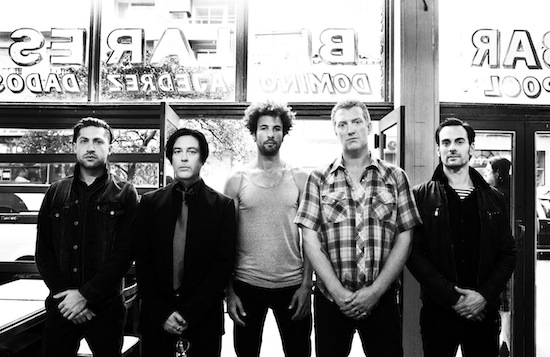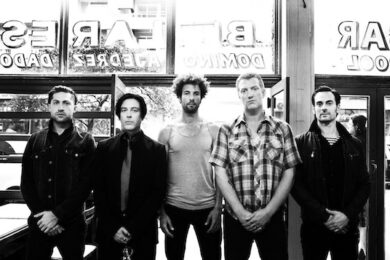Earlier this month, Queens Of The Stone Age returned from a six-year gap to release their sixth album … Like Clockwork. After building a committed fan base since their eponymous debut in 1998 and then continuing with 2002’s chart breakthrough Songs For The Deaf, they’ve seemingly gone from strength to strength, churning out records that have steadily developed on their signature theme of tuned-down sludgy guitars and catchy hooks.
They’ve often straddled the fence between the serious hard rock band that formed from the dissolution of Kyuss in the nineties and something of a parody of exactly that, bastardising rock & roll clichés and tongue in cheek promotional videos (have a watch of their ‘Secrets Of The Sound’ video with Matt Berry from the end of last year).
It’s not often that a band that have been running for seventeen years release material that sounds as fresh as that which made them known in the first place. But with …Like Clockwork Josh Homme and co. have done exactly that.
Following their recent stop at the BBC’s Maida Vale studios, and in an interview much delayed by intoxicated post-session hijinks and a discussion about the logistics of visiting the London Dungeons – "We don’t want to miss this opportunity to see torture apparatus on a private guided tour like a total asshole snob", says Homme – we caught up with the band to talk about the new record – head to the foot of the piece for the band’s UK tour dates in November.
The buzz and excitement around Queens couldn’t be any bigger off the back of …Like Clockwork. How does that make you feel as a musician, person and as a band after 17 years?
Josh Homme: It’s really cool, actually. I think we’re realising that we didn’t have any expectations so it’s kind of nice.
Troy Van Leeuwen: I think we’re just glad that we’ve finished the record and now we’re out here talking to you.
JH: See, we’ve always had a lot of fans that have been there. It’s never been bad. So it’s not like "this is your come back record". I’m sorry, where did we go? Did we go somewhere?
TvL: [whispers] We’ve always been here.
JH: This is just what we do. So we’re doing it and we’re going to do it again.
Queens have been going since 1996, which is an age in the current musical climate. How do you ensure that you keep yourself essential?
TvL: We take vitamins. A lot.
JH: I think you just do it honestly. You know? We don’t take ourselves very seriously but we take music very seriously. It has to be a real interpretation of something that you actually feel and that’s always vital. That’s nothing to do with us. That’s just a vital thing to do. Just check your own pulse.
You said that you’re glad to have finished the record. It’s been fairly well documented that it was a difficult process of recording. Was it getting the material out or the content of the subject matter on the record?
JH: The umbrella over all that is that each song needs to be represented accurately. There are a lot of aspects to it, sonically getting it right. It’s like you wouldn’t want to wear someone else’s clothes to explain yourself. So it’s about getting the character of each song correct because they are real things that deserve to be represented accurately. Then you’re free to like them or dislike them at your leisure. Getting the character of each song right was difficult because we were all walking to some destination that we didn’t know where it was. That was very different to our other records. [On] all our other records we’ve been like we’re going to end up way over there [points to the distance]. You see that? So you walk to where you’re looking. But when you’re looking at a fog bank and walking straight into a fucking cloud, you don’t know where the hell you’re going, you know?
The record feels quite wounded but defiant at the same time. Did you feel that juxtaposition as you were writing the record?
JH: [laughs] That’s how I feel when I’m sitting on the couch. I’ve been knocked down many times. But there’s just a part of me that just fucking enjoys it. But everyone gets knocked down. My granddad used to say: “Everyone gets knocked down. It’s the style with which you get up that’s important”. So yeah coming back to your question, we’re very defiant. If you knock us down we’re always gonna get back up and say, "and now it’s our turn knock something down". And I think that’s the way to pursue this, just to get up.
There’s a line in ‘The Vampyre Of Time And Memory’ that says "I’ve survived, I speak, I breathe, I’m incomplete". I think that sums up the record. For every negative there’s a real defiant positive. Was it like that from the beginning? Was it always quite stoic? It feels like the record could have come off quite melodramatic or defeatist.
JH: It could have yeah, and it could have come off very pessimistic.
But it hasn’t.
JH: Well I’m really glad, because I was worried about that. That’s why ‘Vampyre…’ was really difficult, personally. I had that song at the house before these guys had heard anything. I never do demos ‘cos I’d rather us guys just do them together and work them out together. And do it once. But with this I did three or four demos. I don’t think all of them made it onto the record but that was the first song and I thought, "who the fuck would want to hear this?" So it was about getting past that hurdle, because I don’t want to be melodramatic. I’m not complaining. This is the best job ever but it also has these moments where it fucks with your head. But there are moments in life that fuck with your head. What are you supposed to do? It was my wife, Brody [Dalle], who really helped me cross that first hurdle because I said, “I fucking hate this. Why would someone wanna fucking hear this, from me?” And she said “Who fuckin’ cares?” And I was reminded, that’s right, who cares? You know. Who fuckin’ cares?
You mentioned texturally it was a difficult record to get right. There are lots of synths and keys all over the record. Did having Dean Fertita on board full-time change things?
JH: Having the dark twins, period [points either side of him to Fertita and Van Leeuwen]. They both have this intimate knowledge of obscure and uncomfortable sonic textures. Where you’re like, "oh god, I feel like I’m at the dentist or something." And when you double down on the creepy, this was about what not to put in and leaving these sonic rib bones exposed. I mean it would not be the same without the impact of this group of people always trusting each other.
Dean Fertita: The fun part about this record is that there was no defined role for anybody. So whoever had the good idea wins, right? We didn’t go in saying you’re doing all the keys and you’re doing all the guitar or whatever. It was just wherever the integration of the idea came from. So what’s exciting to me is that what you hear on the record is a response or reaction to what somebody else did and that’s just the way we work together.
TvL: Yeah, I mean everybody on the record has played keyboards at one point and on stage everybody now plays keyboard at one point. There have always been sprinklings of keys or lap steel or any kind of ambience but we all like to do that now. Mike [Shuman]’s not playing bass on ‘Kalopsia’. It’s kind of a free for all because anybody can play just about any instrument.
JH: And that’s what took a while, too. I think one of the interesting things was that when you could do anything, what do you do? Sometimes it’s a bit like eating an elephant, you know? It seems impossible but really you just start by taking a bite and getting on with it. I think there’s a lot of an element of get over yourself and get started on this record as that’s what was actually required to do it. So it became such a document of ‘this happened yesterday’. ‘Smooth Sailing’ was one of the other early demos that looked so promising but just never came together until the very end. When we were so sick of being like ‘aah this is a bummer’ and then that became…
TvL: That’s the defining moment of the record.
JH: Where you hit back, you know? It’s a direct face punch in the mirror. You know what I mean?
Would you agree with the statement that this is your best record lyrically?
JH: This is the best record we’ve made, period. I mean, I know that I’m proud of all our records. But this is our sixth record, this is the culmination of everything we’ve ever learned and everything we know in the moment when you think you know the least.
Does it concern you before you do it as to what the reaction will be to the lyrics and the music, or the record as a whole?
JH: Yeah. But what am I supposed to do? I can’t do anything about what somebody else does and so I don’t try. I can only do what I’m supposed to do. We can only collectively give it our best effort. Then you can feel good about saying, well, turn the CD into a coaster if you need to and if you don’t and if you listen to it fifty times you’ll hear something you never heard until that fiftieth time. And then you know we’re serious about the music. But we’re also still a bunch of fuckin’ dumbasses that stayed out ‘til seven the night before.
You could repeat the formulas you’ve used on previous records endlessly, and probably be hugely successful, but you’ve tended to just throw that to the dogs and come back with something undeniably Queens-sounding but undeniably different. To borrow from your own phrase, could Queens ever become like clockwork or are you ready to throw it all to the dogs again?
JH: Risk nothing, get nothing. Hell, I remember Interscope saying, “do that again” and I was like, you don’t know us at all. We can’t. I’m sorry. I mean some people like this record but don’t like that record. But I’m always just like you just don’t get it, man. I mean, what choice do we have? I don’t have a choice. We’re doing the only thing that we can actually do, and we don’t do it twice.
Queens Of The Stone Age tour dates:
NOVEMBER
Sat 16 – Hydro Arena, Glasgow
Sun 17 – O2 Arena, Dublin
Mon 18 – Odyssey, Belfast
Wed 20 – MEN Arena, Manchester
Thu 21 – NIA, Birmingham
Fri 22 – Wembley Arena, London – SOLD OUT
Sat 23 – Wembley Arena, London



